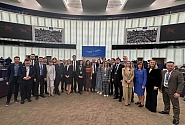
The Parliamentary Assembly of the Council of Europe in Strasbourg, France, unanimously approved a resolution on support for the reconstruction of Ukraine. The Assembly’s decision was taken in the presence of the President of the Ukrainian Parliament Ruslan Stefanchuk, who stressed the importance of the resolution his address to the Assembly.
The Parliamentary Assembly of the Council of Europe at its plenary session in Strasbourg recommended “confiscation and use of Russian state property” to support the reconstruction of Ukraine. Such action would “strengthen Ukraine, ensure the accountability of the Russian Federation and discourage any further aggression in the future”.
In the unanimously adopted resolution, the Assembly underlines “the obligation of the aggressor State, the Russian Federation, to provide full compensation for the damage, loss, and injury caused by its internationally wrongful acts, including the destruction of infrastructure, loss of life, economic hardships, and other adverse effects, in accordance with the principles of international law”. The resolution is based on a report by the representative of the Albanian Parliament Lulzim Basha and was drafted by the Political Committee of the Assembly, which includes Zanda Kalniņa-Lukaševica, Deputy Speaker of the Saeima, Head of the Latvian Delegation.
“Adopting this resolution has created a legal basis for confiscating frozen Russian state assets and handing them over to Ukraine’s reconstruction,” notes Zanda Kalniņa-Lukaševica, calling on the Heads of State, Governments and Parliaments to do their part and implement measures as soon as possible to confiscate and hand over Russian frozen assets for the reconstruction of Ukraine.
The resolution states that the financial assets of Russia, which have already been frozen by a number of countries – around USD 300 billion – must be transferred to the reconstruction of Ukraine. The already documented losses of Ukraine’s infrastructure and economy caused by the aggression of the Russian Federation had reached USD 416 billion in June 2023.
The Assembly called for the establishment of an international compensation mechanism under the auspices of the Council of Europe to comprehensively compensate the losses suffered by the affected natural and legal persons and the Ukrainian state as a whole. It recommends the creation of an international trust fund in which all frozen Russian state assets would be deposited. It is also proposed to establish an “objective and effective International Claims Commission”.
In its resolution, the Assembly urges all countries in which the Russian state assets are located to work together and transfer these assets immediately to the international compensation mechanism.
Finally, the Assembly recalled that the Council of Europe has been a leader in expressing its solidarity with Ukraine and its people and excluding Russia from this organisation, and has set up a Damages Register to record the damages suffered by Ukraine. The establishment of a Damages Register, which is already operational, was the first step in bringing Russia to account for its illegal activities.
“We have taken the first steps to bring Russia to justice, but a significant part of the road is still ahead of us,” Kalniņa-Lukaševica said.
Deputy Speaker Kalniņa-Lukaševica participates in the spring session of the Assembly this week until 18 April. She is accompanied by the Deputy Head of the Latvian Delegation Edmunds Cepurītis and Substitute Permanent Representatives Ināra Mūrniece, Ričards Šlesers and Aiva Vīksna.
The Parliamentary Assembly of the Council of Europe is one of the Council of Europe’s largest and most visible institutions. It brings together 306 permanent representatives and 306 substitutes from 46 member states of the Council of Europe. In the Assembly, the countries are represented by members of national parliaments.
Saeima Press Service







